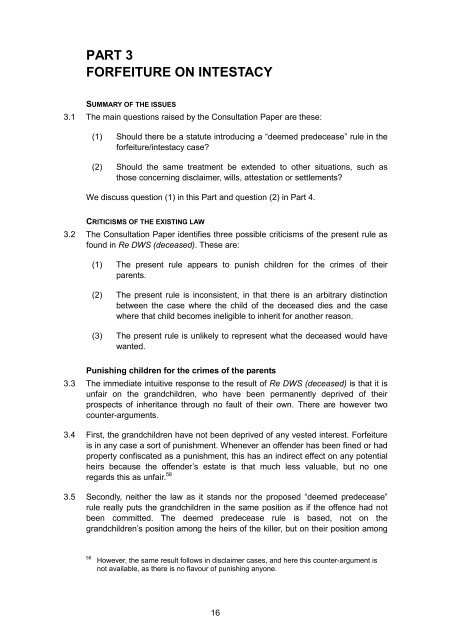The Forfeiture Rule and the Law of Succession ... - Law Commission
The Forfeiture Rule and the Law of Succession ... - Law Commission
The Forfeiture Rule and the Law of Succession ... - Law Commission
You also want an ePaper? Increase the reach of your titles
YUMPU automatically turns print PDFs into web optimized ePapers that Google loves.
PART 3<br />
FORFEITURE ON INTESTACY<br />
SUMMARY OF THE ISSUES<br />
3.1 <strong>The</strong> main questions raised by <strong>the</strong> Consultation Paper are <strong>the</strong>se:<br />
(1) Should <strong>the</strong>re be a statute introducing a “deemed predecease” rule in <strong>the</strong><br />
forfeiture/intestacy case?<br />
(2) Should <strong>the</strong> same treatment be extended to o<strong>the</strong>r situations, such as<br />
those concerning disclaimer, wills, attestation or settlements?<br />
We discuss question (1) in this Part <strong>and</strong> question (2) in Part 4.<br />
CRITICISMS OF THE EXISTING LAW<br />
3.2 <strong>The</strong> Consultation Paper identifies three possible criticisms <strong>of</strong> <strong>the</strong> present rule as<br />
found in Re DWS (deceased). <strong>The</strong>se are:<br />
(1) <strong>The</strong> present rule appears to punish children for <strong>the</strong> crimes <strong>of</strong> <strong>the</strong>ir<br />
parents.<br />
(2) <strong>The</strong> present rule is inconsistent, in that <strong>the</strong>re is an arbitrary distinction<br />
between <strong>the</strong> case where <strong>the</strong> child <strong>of</strong> <strong>the</strong> deceased dies <strong>and</strong> <strong>the</strong> case<br />
where that child becomes ineligible to inherit for ano<strong>the</strong>r reason.<br />
(3) <strong>The</strong> present rule is unlikely to represent what <strong>the</strong> deceased would have<br />
wanted.<br />
Punishing children for <strong>the</strong> crimes <strong>of</strong> <strong>the</strong> parents<br />
3.3 <strong>The</strong> immediate intuitive response to <strong>the</strong> result <strong>of</strong> Re DWS (deceased) is that it is<br />
unfair on <strong>the</strong> gr<strong>and</strong>children, who have been permanently deprived <strong>of</strong> <strong>the</strong>ir<br />
prospects <strong>of</strong> inheritance through no fault <strong>of</strong> <strong>the</strong>ir own. <strong>The</strong>re are however two<br />
counter-arguments.<br />
3.4 First, <strong>the</strong> gr<strong>and</strong>children have not been deprived <strong>of</strong> any vested interest. <strong>Forfeiture</strong><br />
is in any case a sort <strong>of</strong> punishment. Whenever an <strong>of</strong>fender has been fined or had<br />
property confiscated as a punishment, this has an indirect effect on any potential<br />
heirs because <strong>the</strong> <strong>of</strong>fender’s estate is that much less valuable, but no one<br />
regards this as unfair. 58<br />
3.5 Secondly, nei<strong>the</strong>r <strong>the</strong> law as it st<strong>and</strong>s nor <strong>the</strong> proposed “deemed predecease”<br />
rule really puts <strong>the</strong> gr<strong>and</strong>children in <strong>the</strong> same position as if <strong>the</strong> <strong>of</strong>fence had not<br />
been committed. <strong>The</strong> deemed predecease rule is based, not on <strong>the</strong><br />
gr<strong>and</strong>children’s position among <strong>the</strong> heirs <strong>of</strong> <strong>the</strong> killer, but on <strong>the</strong>ir position among<br />
58 However, <strong>the</strong> same result follows in disclaimer cases, <strong>and</strong> here this counter-argument is<br />
not available, as <strong>the</strong>re is no flavour <strong>of</strong> punishing anyone.<br />
16
















